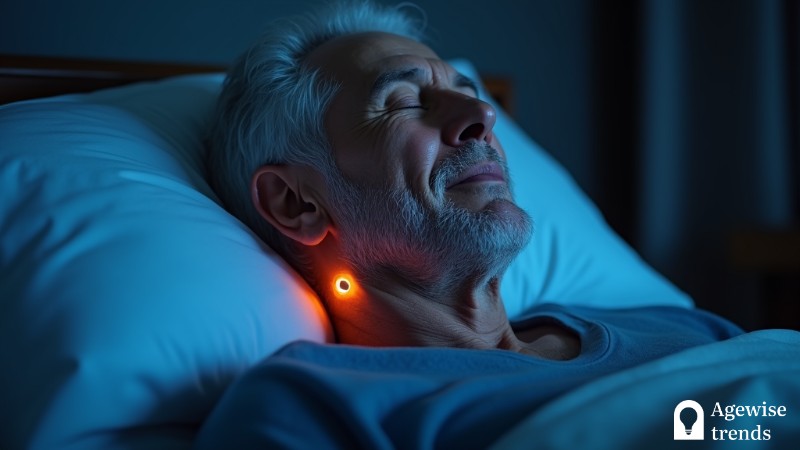With a growing number of people facing sleep difficulties, melatonin supplements have become one of the go-to solutions for a restless night. Melatonin, a hormone naturally produced by the pineal gland, helps regulate the body’s circadian rhythm and signal that it’s time to sleep.
Supplementing melatonin is often considered a safe, “natural” alternative to prescription sleep medications, yet long-term use and dependency risks raise important questions about its efficacy and safety.
Here, we explore the ways melatonin affects sleep, interactions with medications, alternatives for long-term improvement, and the importance of consulting healthcare professionals before adding it to your routine.
Key Takeaways
Melatonin supplements have become a popular solution for sleep difficulties, but long-term use and dependency risks raise questions about its efficacy and safety.
- Melatonin can lead to psychological dependence and disrupt natural sleep habits when used frequently.
- High doses of melatonin can cause side effects such as daytime drowsiness, headaches, and mood changes, and interact with various medications.
- Cognitive behavioral therapy (CBT) for insomnia is a recommended treatment for chronic sleep disorders like insomnia, targeting underlying causes rather than masking symptoms with supplements.
Melatonin’s dependency risks
Melatonin has become a popular option for those who find themselves struggling to fall asleep or manage shift work and jet lag. While melatonin does not produce the same chemical addiction risks as some sleep medications, dependency can still develop.
People who take melatonin frequently may begin to rely on it as part of their nightly sleep routine, believing it’s necessary to fall asleep. This psychological dependence, while not addictive in the traditional sense, can influence users to perceive melatonin as an essential component of their sleep routine.
Dr. David Cutler, a family medicine physician, clarifies that melatonin isn’t habit-forming in the same way that many prescription sleep aids are. However, when used frequently, it can create a reliance that may disrupt natural sleep habits over time.
He recommends that melatonin be considered a short-term solution to help with specific, temporary sleep problems like jet lag or shift work adjustments. Prolonged usage may, paradoxically, impact the body’s ability to regulate its sleep cycle, as the brain may reduce its natural melatonin production in response to regular supplementation.
Experts suggest combining melatonin with strong sleep hygiene practices rather than relying on it nightly. A consistent bedtime, a comfortable, dark sleep environment, and routines that promote relaxation can often make a more significant difference in achieving better sleep. Dr. Alex Dimitriu, a psychiatrist and sleep specialist, advises limiting melatonin use to no more than three months.
According to him, long-term improvement comes not from supplements but from sustainable changes in habits and sleep practices. For instance, he recommends dimming lights and minimizing screen exposure before bed to support natural melatonin production.
The downside of medication interactions
Although widely regarded as safe, melatonin supplements are not without risks, especially when taken in high doses over extended periods. Melatonin misuse can disrupt the body’s natural hormone balance, possibly affecting sleep quality and duration when supplementation is discontinued. This can become particularly problematic for individuals who self-prescribe melatonin without a clear understanding of the appropriate dosage.
High doses of melatonin can lead to side effects such as daytime drowsiness, headaches, dizziness, and, in some cases, mood changes. While occasional use may have minimal impacts, routine high dosages can interfere with the body’s circadian rhythm and lead to a dependency on the supplement.
Moreover, melatonin has significant interactions with various medications. It is especially important for those on prescription medications to consult with their healthcare provider before starting melatonin. For example, melatonin can interfere with blood-pressure medications, immunosuppressants, and diabetes treatments, altering their effectiveness.
Dr. Cutler highlights the importance of discussing potential side effects and interactions with a healthcare provider to avoid unintended health consequences. He points out that certain health conditions, like autoimmune disorders or chronic illnesses, may worsen with regular melatonin supplementation due to these interactions.
In some cases, individuals on medication for blood pressure or diabetes may need to adjust their treatment if melatonin is introduced, as it can increase risks associated with blood pressure management and glucose control.
This makes an informed conversation with a doctor crucial before integrating melatonin into a treatment plan. Even for individuals not on medication, consulting a physician before starting a new supplement can prevent unnecessary complications and foster a more balanced approach to sleep health.
Melatonin managing sleeping disorders
While melatonin is accessible and often beneficial for short-term sleep issues, relying on it as a remedy for chronic sleep disorders like insomnia is typically not recommended.
Those with sleep disorders may initially find melatonin helpful; however, this quick-fix approach may mask underlying issues that need comprehensive treatment. Over time, reliance on melatonin can become counterproductive, leading to frustration and decreased sleep quality when not taken.
Insomnia and other sleep disorders often have underlying causes such as stress, anxiety, or lifestyle factors. Cognitive behavioral therapy (CBT) for insomnia (CBT-I) is a commonly recommended treatment to address these factors without the need for supplements.
Dr. Dimitriu points out that CBT-I is a valuable option for treating sleep disorders because it targets the habits and thought patterns contributing to poor sleep. Through CBT-I, individuals learn to develop healthier sleep routines and manage anxiety, ultimately addressing the root of the problem rather than masking it with melatonin or other sleep aids.
CBT-I involves a structured program that encourages healthy sleep patterns and addresses factors like stress and anxiety, often through relaxation techniques and sleep scheduling. The American Academy of Sleep Medicine endorses CBT-I as a first-line treatment for insomnia, as it has shown long-term effectiveness without the risks associated with supplements or medications.
Techniques used in CBT-I, such as stimulus control and sleep restriction, aim to reset the body’s natural sleep cycle, making it an ideal option for those looking to improve sleep without reliance on melatonin.
Individuals who experience significant sleep difficulties should consult with a sleep specialist or therapist trained in CBT-I before starting melatonin or any other sleep aid.
Addressing the core causes of sleep disturbances can lead to a more sustainable improvement in sleep quality, helping individuals avoid cyclical dependency on external supplements.
Pursuit of natural sleep solutions
As people age, melatonin production naturally decreases, often leading to disrupted sleep patterns, difficulty falling asleep, and early awakenings. Older adults, particularly those facing sleep disturbances, may consider melatonin as a convenient remedy for these age-related changes.
While some healthcare providers may recommend melatonin in small doses for short-term relief, caution is advised, especially since sleep disturbances in older adults can also signal other underlying health issues.
For older adults, Dr. Cutler advises exploring non-supplemental methods to improve sleep quality before turning to melatonin. Consistent sleep schedules, physical activity, and adequate daylight exposure can help circulate the body’s rhythm and stimulate natural melatonin production.
Physical activity, such as walking or light aerobic exercise, can improve sleep quality and increase daytime energy levels. Additionally, regular exposure to natural light helps reinforce the body’s internal clock, promoting better sleep onset at night.
Relaxation techniques, including progressive muscle relaxation, deep breathing exercises, and mindfulness meditation, can be particularly helpful for those with sleep difficulties.
Developing a relaxing pre-sleep routine, like taking a warm bath or listening to calming music, can also serve as an effective substitute for melatonin in establishing a healthy sleep environment.
For seniors already taking melatonin, consulting with a healthcare provider can help them understand proper dosages and monitor for any side effects. Melatonin is sometimes prescribed as part of a broader treatment plan for age-related sleep disruptions, but regular communication with a doctor remains crucial to avoid interactions with other medications and ensure safe use.
Approach to melatonin for better sleep
Melatonin, while a readily available and natural solution to sleep problems, should be approached with caution and awareness of its limitations. For those dealing with temporary sleep issues, melatonin can offer relief, but it is not intended to be a cure-all.
Whether managing age-related sleep changes or occasional sleep disruptions, adopting a balanced approach and consulting with healthcare professionals can pave the way to better, more natural sleep.
By making informed decisions about melatonin and prioritizing overall sleep hygiene, individuals can improve their sleep quality and ultimately enjoy a more rested, refreshed start to each day.















